#Building Strategy
Explore tagged Tumblr posts
Text
🌟 If you're struggling with the Buying Time Mission in Empire of the Ants, we've got you covered! 🐜✨ Dive into our step-by-step guide and learn how to collect resources, build structures, and defend your colony efficiently. Time is ticking—are you ready to master this challenge? ⏳
#Empire Of The Ants#Buying Time Mission#Gaming Guide#Ant Colony Survival#Resource Management#Colony Expansion#Game Strategy#Mission Tips#Fast Paced Gaming#Ants#Gamers Guide#Gaming Community#Building Strategy#Defend Your Colony#Time Management Tips#Worker Ants#Protect Your Territory#Gaming Challenge#Strategy Games#Game Walkthrough#Ants In Games#Collect Resources#Quick Thinking#Gaming Tips#Survival Games#Time Limit Challenge#Video Game Guide#Ants Life#Ant Colony#Gamer Life
1 note
·
View note
Text
Been There, Done That
Capitano, before leaving for Natlan: The Pyro Archon is a fool and a liability to Natlan. It falls upon me to do what is necessary to ensure the nation is not lost to the Abyss.
Arlecchino: Indeed. Have you considered, however, that the Pyro Archon may not be as useless as you suspect?
Capitano: Elaborate.
Arlecchino: Suppose that the Pyro Archon does in fact have an actionable plan, one which she has been secretly implementing for the past 500 years. If so, attacking her in an attempt to seize the gnosis may well accomplish little of value, while needlessly limiting your opportunities for kissing her on the mouth in the future.
Capitano: ...you speak on that last part from personal experience, then?
Arlecchino: I have witnessed others make similar errors in judgment, that is all.
Capitano: Fortunately for me, the Pyro Archon seems to like it when people try to kill her. In that regard, it will be easy for me to avoid repeating your mistakes.
#genshin impact#genshin#fatui harbingers#fatui#capitano#mavuitano#arlecchino#arlefuri#building “enemies to lovers” into your battlefield strategies is the best way to wage war#good lord peruere you sapphic catastrophe#the art of love and war
306 notes
·
View notes
Text
Man, even if I had 170$ to blow on a Mario Kart lego set ain't no way I'm bringing that many tiny pieces into a household with a two year old and an eight month old.
He's cute though, I'll give him that

#I do respect LEGO for their sustainable materials strategy and all the fun you can have with the pieces once you build the actual set#but I'm going to have to hold off for now#In any case I gotta save up to be able to get my mitts on that Nintendo Switch 2#... probably not on launch but this year if I play my cards right#though if they launch a switch-2-only game that activates enough hyperfixation neurons I might cave early -_-
55 notes
·
View notes
Text

I don't talk about my gacha pulls literally ever but holy fuck. Holy fuck. This was at 30 pity. What the fuck??? This is literally the only 5 star i have at anything other than E0?????
#gacha pulls#honkai star rail#hsr aventurine#aventurine honkai star rail#i might have to use a strategy other than “if anything even looks at boothill i will stomp it to death with my hooves”#hang on I'm building him right now immediately
72 notes
·
View notes
Text
“That's why we told you to vote for Kamala! She would have been better for Palestine!”
Oh I'm sorry. Did I hallucinate the hundreds of posts with thousands of notes framing the palestinians being genocided as the trolley problem, and painting Kamala as the “99% Hitler” and the lesser evil™ because like trump AND biden, she'd also let the palestinians die but she might turn out to be better when it came to other stuff? Did no one else see that shit? Just me? Okay.
#genocide aside she ran a shitty campaign#maybe instead of building her entire campaign on the long sought after but ever mythical moderate republican#she could have just...catered to the left?? y'know the demographic that actually shows up for the democrats??#but no she made the conscious decision to market herself as republican lite#maybe she should have just stuck to her original strategy of treating right wingers as weirdos#instead of campaigning with Liz Cheney and declaring she'd have a republican in her office#you know...just a thought#but noooo why demand your politicians take accountability for their actions when you could just#pin the blame on other citizens??#10/10 foolproof strategy keep it up folks
56 notes
·
View notes
Text


I hadn’t been afraid that she wasn’t my friend, I had been afraid that she was, and what it did to me.
#reading#books read in 2025#bookblr#books#book photography#book blog#bibliophile#books reading#books and reading#exit strategy#martha wells#murderbot#murderbot diaries#the murderbot diaries#mensah#secunit#sanctuary moon#pin lee#gurathin#dr ratthi#murderbot series#murderbot novellas#what makes us human#found family#emotions#friendship#building trust#i love this series so much#review#may reads
47 notes
·
View notes
Text
The world sucks, but at least this game is funny.
Wishlist Muffles Life Sentence on Steam now.
EPISODE 2 coming soon.
#indie games#muffles#rpg#indiedev#game development#strategy games#deck building#psychological horror#off game#lisa rpg
85 notes
·
View notes
Text
I hope this trend where every videogame tries to be some kind of card game at one point fucking ends
#cosas mias#si quiero jugar a las cartas juego al truco#specially relevant to strategy games#if I'm playing a strategy game I'm playing to lead or manage or build something. not a fucking casino.
30 notes
·
View notes
Text
I’m noticing that the Decepticons in g1 are actually pretty intelligent, at least when it comes to engineering feats
Like they’re constantly building new bases, temporary or otherwise, unlike the Autobots who don’t even build out from the Ark’s place in the volcano. They make so many elaborate machines to extract energy, of which need to harness countless different energy sources, and they almost always successfully create Energon from them, the Energon only being unstable when the source itself is, not their process
And on top of energy machines, they build other impressive machines to hinder the Autobots in whatever way, and it’s not just one person who makes them, they all do. Like, Megatron on his own created a machine that successfully clones other Transformers, outside of having a working brain. And he’s made other things too, that’s just the one I remember. I know Starscream’s had his own scientific contributions, but I can’t remember them at the moment other than rigging an experimental energy source to explode the planet for infinite energy
Edit: I actually do now have an example for Starscream, namely the episode where they accidentally time travel to King Arthur times, in which Starscream invents a working electricity generator to power him and the other stranded Decepticons with technology and materials from the 500s, and creates gunpowder at least 300 years or so before it’s invented in China. I know Transformers technology is far past that, but the fact that he knew how to do this and was able to with incredibly archaic technology by their standards is a feat all on its own
Like their machines almost always work, it’s just that the Autobots destroy them or they tap into an energy source they didn’t fully understand the consequences of (or just didn’t care)
And you can’t even say the Autobots have the leg up by creating new Transformers, because I’m pretty sure the Decepticons made the Constructicons as well, who are also fairly skilled builders. And also have the ability to combine, and were the first I know of capable of doing so
Like I guess the Decepticons just all have degrees in STEM or something. Shame that seems to be where all their intelligence points went
#put these guys on a dead Cybertron and make them not evil#they’d get the planet successfully repaired and running in a week tops#we didn’t watch g1 today but it’s something that’s been going through my brain#pretty much all the Decepticons have extensive scientific knowledge#it’s not just one scientist guy#or at least I noticed that with Megatron#a lot of their machines he builds himself#which was a bit surprising to me when I noticed it#since you know he’s mostly known for his skill as a combatant and as a gladiator#sure he’s got smarts but they usually seem to be focused in strategy and manipulation#not in STEM related areas#this also applies to Starscream too but they did say he used to be a scientist in this continuity#so it technically fits him and it flies a bit under the radar#but yeah something I noticed#transformers#transformers g1#decepticons#megatron#random stuff
61 notes
·
View notes
Note
I don't know if you play Honkai Star Rail, but your hunter!Crewel design looks like a character called Boothill

Ya I know, I actually have him in game :))))))) (I don't play it lately though it's too time consuming) (yes his name is "the gravedigger" in french, idk )
Didn't have him in mind when drawing outfits for crewel though, they just share the same color palette (I had that idiot from "the vampire dies in no time" in mind in desogn only though not personality :")
#pointy teeth is peak chara design#don't mind the build I just throw random shit at my characters because I kinda hate having to think about what has the best stats for them#my strategy in every game is just “go strongest character do your thing go bonk !”#that's how I finished fire emblem awakening thank you donnel#alternative strategy is to just slay and play with favorite characters/outfits even if it's not even good I will lvl up lorenz and linhardt
47 notes
·
View notes
Text
I do love that Katie is very open about her motivations.
Not completely, not in the way Jade is, but it's not like the group is unaware that Katie is ambitious. That she hates being a thin blood and wants to be done with it.
There's a world in which Katie is exactly the same person except that she doesn't open her mouth and tell the rest of the coterie- Hey I want to move up the next rung of the ladder and I'm perfectly fine with it if that means killing kindred.
Where she works towards the exact same goal but deliberately hides what she's doing from the rest of the coterie.
Her idea is still dangerous but I can appreciate Katie being open about having that dangerous idea in the open where the rest of the coterie can be informed about the complications it might bring them down the line.
#I also really love that openess does not actually preclude manipulation#Part of the strategy Katie's honesty is that she is trying to build a case for why the coterie#And other thin bloods should embrace her idea. After all they do have the numbers advantage#And if she maybe doesn't draw attention to the fact that this means that not every thin blood can drink a kindred to take their place#Well it's not like they can't come to the same conclusion if they actually thought about it#katie private nightmares#aabria iyengar#private nightmares#project ghostlight
19 notes
·
View notes
Text
Rosmontis' IS module is incredibly fun to work with, use, and build around. If you have her at module level already, I'd totally recommend the trivial 3 module block cost to acquire it.
I saw a statement from someone else a while ago, arguing that Rosmontis was one of if not the very best IS sniper picks with the module, and I find myself no longer skeptical but in enthusiastic agreement.


These tactical equipments are incredible for a variety of reasons. Giving Rosmontis and all subsequent casters or snipers a free roadblock does wonders at slowing down enemies. You can prioritize and plan in different ways because you have access to a free defender that can also stun if deployed on an enemy.
And that's not even to cover that they reduce enemy defensive stats pretty vastly, including the crystals. Rosmontis can get defense thresholded pretty aggressively, so reducing an opponent's defenses will often either give her the ability to meaningfully damage them, or turn her into Exusiai and rip through low defense enemies.
The Tactical equipments also have zero attack, allowing you to stall the one remaining enemy on the map and finish bonus objectives in chests and crystals as well. Not game changing, but very useful.
The last main thing is that because she counts as a caster too now, she can take advantage of more relics. 'Duh,' I suppose, but the important implication is that in a roguelike, random chance is less vicious, and by the end of the run she's double dipping. Dealing normal hits of arts damage allows her to scale with any arts boosting relics as well, further increasing her applicability and viability.
Which is how you get statlines like this:

Being receptive to a Hand relic is also a huge selling point, and Hand of Rumble is especially good for her because it's based on 'instances of damage.' For the unit that can apply three in regular attacks. It doesn't matter if the buff wears off after five seconds if it only takes her three to get back nearly to full. Her second skill raises it to five instances, meaning that her second attack will have +75% damage, and her third will be maxed out at +150% damage. The main downside of requiring constant attacking is completely irrelevant, she just gets the buff.
The numbers that Narcissa gets to are absolutely absurd, and she will cut through FS15 elite enemies like they're originium slugs.
If we look at this number, it means that a single on-skill attack is doing:
5565 Phys
5565 Phys
5565 Phys
2782 Phys
5565 Arts
And now, have a few of the pillar forests I've planted across a few runs






In short, in total; not only is this module extremely viable and worthwhile, it's more importantly very fun to use and play with.
#arknights#integrated strategies#rosmontis#i've considered building april the fast redeploy sniper because she would allow me to have more pillars
21 notes
·
View notes
Text


The collapse of workerism
Of course, some would have it that we never lost a revolutionary perspective at all, quite confident they had the solution all along. This comes in the form of workerism, a broad set of strategies – mainly Marxist or anarcho-syndicalist – that affirm the centrality of the working class for overthrowing capitalism. In the history of revolutionary struggle, few ideas have consistently held more sway; but surely that’s only the reason why this sorely outdated approach has proven so hard to get over. Things have changed more dramatically than ever in the last decades, shattering the material conditions that once granted workplace organisation such grandiose pretensions. It’s important to clarify why, or else the attempt to exceed activism risks being subsumed by yet another reformist method, this one all the more stagnant.
Only a few decades ago, the prospects of organised labour in the Global North were much more hopeful, with trade unions retaining a great deal of strength into the 1970s. Mainly during the ‘80s, however, capitalist production underwent some major alterations. Profound technological developments in the field of electronics – especially digitisation – caused the productive process to become much more automated, requiring significantly less human input. This combined with an increased ability on the part of employers to outsource employment to less economically developed countries, where labour was much cheaper. Fairly suddenly, therefore, the two biggest sectors of the economy – split mainly between industry and agriculture – were greatly reduced in size, resulting in massive layoffs. Yet those who lost their jobs were generally absorbed by steady growth in the services sector, thereby avoiding immediate social destabilisation. Whilst it was once the smallest economic sector by a long way, the services sector is now by far the largest in the Global North, even approaching 80% employment rates in the US, UK, and France.
The result has been a striking redefinition of the common notion of work. It’s lost its centre of gravity in the factory, having fragmented instead in the direction of various post-industrial workplaces – restaurants, shops, offices. Once a largely centralised mass, the working class has been dispersed across the social terrain, the new focus being on small, highly diverse productive units. Between these units, workers possess few common interests and interact little, leading to a significantly diminished potential for collective action. Of course, resistance in the workplace continues, but the internal avenues necessary for revolt to generalise have been majorly severed, the situation continuing to decline in light of ever greater technological advance.
Nobody can deny the profound identity crisis faced by the working class. Only a few decades ago, the factory was seen as the centre of everything, with workers offering the vital component in the functioning of society as a whole. Work was once a way of life, not so much in terms of the amount of time it took up, but instead because of the clear sense of existential grounding it offered. For generations, there had been a strong link between work and professionalism, with most workers committing to a single craft for the entirety of their lives. Career paths were passed down from father to son, who often remained in the same company; the families of different workers also maintained close ties with one another. Nowadays, however, everything has changed: employment is immensely uncertain, the relentless fluidity of the post-industrial economy forcing most to get by on a roster of precarious, low-skilled jobs. Far fewer people take pride in their work, especially given that employment only rarely has a convincing subtext of doing something socially important. Trade unions have also vanished as a historical force, having been defeated in the key battles of the ‘80s, their membership levels imploding in lock-step with the advance of neoliberalism. A residue of the old world still exists, but it continues to dissipate further every day, never to return. In the Global South, too, things are inevitably moving in the same direction.
These developments cast serious doubt on the validity of Marxist and anarcho-syndicalist strategies for revolution. It’s becoming increasingly meaningless to speak of “the workers” in reference to a cohesive entity. It isn’t as if the disintegration of the working class implies the absence of poverty, nor of the excluded – in no sense whatsoever. What it does mean is the end of the working class as a subject. One that was, as Marx put it, “disciplined, united, organised by the very mechanism of the process of capitalist production itself” (Capital, 1867). Over the last decades, the working class has been dismembered and demoralised by the very same mechanism: just as the mass application of steam and machinery into the productive process created the industrial proletariat two centuries ago, the invention of new, automated technologies has led to its dissolution. There’s no single project around which to unite the working class any more; it follows, as with identity politics, that gains in the workplace will almost always be limited to improving capitalism rather than destroying it. The Industrial Revolution has been superseded by the Digital Revolution, yet the revolutionary optimism of workerism remains ideologically trapped in a bygone era, fumbling for relevance in a century that won’t have it. Although, to be honest, this is hardly news: already for some time now, the nostalgic language of workerism has come across as stale and outdated to most, even if academics often struggle to keep up.
In any case, the collapse of workerism might be nothing to mourn. Another implication of the end of traditional employment is the predominance of a range of workplaces few would want to appropriate anyway. The factory has been replaced by the likes of call centres, supermarkets, service stations, fast food joints, and coffee shop chains. Yet surely no one can imagine themselves maintaining these workplaces after the revolution, as if anything resembling a collectively run Starbucks or factory farm is what we’re going for? When workerism first became popular, there was an obvious applicability of most work to the prospect of a free society. In the 21st century, however, the alienation of labour runs all the deeper: no longer is it the mere fact of lacking control over work, but instead its inherent function that’s usually the problem. To put it another way, it should come as no surprise that Marxists haven’t yet replaced their hammer and sickle with an office desk and espresso machine, as would be necessary to keep up with the times. The modern symbols of work are worthy only of scorn, not the kind of valorisation involved in putting them on a flag.
This is another big problem for the workerist theory of revolution, given its conception of revolution primarily or even exclusively in terms of the seizure of the means of production. Achieving reforms in the workplace is one thing, but only rarely can such exercises in confidence-building be taken as steps towards appropriating the workplace altogether. Surely the point isn’t to democratise the economy, but instead to pick it apart: those aspects of the economy genuinely worth collectivising, as opposed to converting or simply burning, are few and far between. Of course, they still exist, but they’re marginal. And that confirms the absurdity of expecting workplace organisation to offer the centrepiece of any future revolution.
This hardly implies doing away with the material aspects of revolutionary struggle, given that communising the conditions of existence remains necessary for living our lives – not just this or that activist campaign – in genuine conflict with the system. All the more, the moment in which these subterranean influences suddenly erupt, and mass communisation overturns the ordinary functioning of the capitalist machine, surely remains a defining feature of revolution itself. Yet such endeavours must be sharply distinguished from seizing the means of production – that is, appropriating the capitalist infrastructure more or less as it stands before us. Far from offering a vision of the world we want to see, the syndicalist proposal to reclaim the conditions of work – to assume control of very the system that’s destroying us – merely implies self-managing not only our own exploitation, but also that of the planet.
As an aside, it should be added that these issues undermine the contemporary relevance of Marxism altogether. It was previously suggested that Marxian class analysis no longer offers a credible account of oppression; the current discussion, meanwhile, suggests it cannot be used to frame the topic of revolution either. As a method for interpreting the world, as well as for changing it, Marxism has had its day. If we wanted to be a little diplomatic, we could say this isn’t so much a criticism of the theory itself, more a recognition of the fact that the world it was designed to engage with no longer exists. If we wanted to be a little less diplomatic, moreover, it should be added that what’s left of Marxism is utterly boring, reformist, and kept “alive” almost exclusively by academics. As the big guy declared back in 1852, “The tradition of all the dead generations weighs like a nightmare on the brains of the living.” Yet in no case has this claim, offered in response to the lack of imagination amongst revolutionaries in the 19th century, been more relevant than with Marxism today. We should pay our respects, if indeed any respect is due, whilst refusing to be crippled by an outdated approach. The same goes for anarcho-syndicalism, its once unbridled potential decisively shut down by the combined victories of fascism and Bolshevism.
To offer a last word of clarification, none of this implies doing away with workplace organisation altogether. There’s still much to be said for confronting power on every front: the collectivisation of any remaining useful workplaces, as well as the fierce application of the general strike, surely remains vital for any effective revolutionary mosaic. Just as workplace organisation continues to prove effective for breaking down social barriers, as well as potentially improving our lives in the here and now. The core claim offered here is only that it cannot be considered the centrepiece of revolutionary struggle altogether – quite the minimal conclusion. Merely in terms of asking what the abolition of class might look like today, workerism has lost its way. And that doesn’t begin to consider the abolition of hierarchy as such. When taken in isolation, organised labour offers nothing more than a subtle variety of reformism, thinly cloaked in its stuffy revolutionary pretensions. Total liberation, by contrast, refuses to single out any focal points of the clash, be they workerist, activist, or otherwise.
#anti-civ#anti-speciesism#autonomous zones#climate crisis#deep ecology#insurrectionary#social ecology#strategy#anarchism#climate change#resistance#autonomy#revolution#ecology#community building#practical anarchism#anarchist society#practical#practical anarchy#anarchy#daily posts#communism#anti capitalist#anti capitalism#late stage capitalism#organization#grassroots#grass roots#anarchists#libraries
34 notes
·
View notes
Text
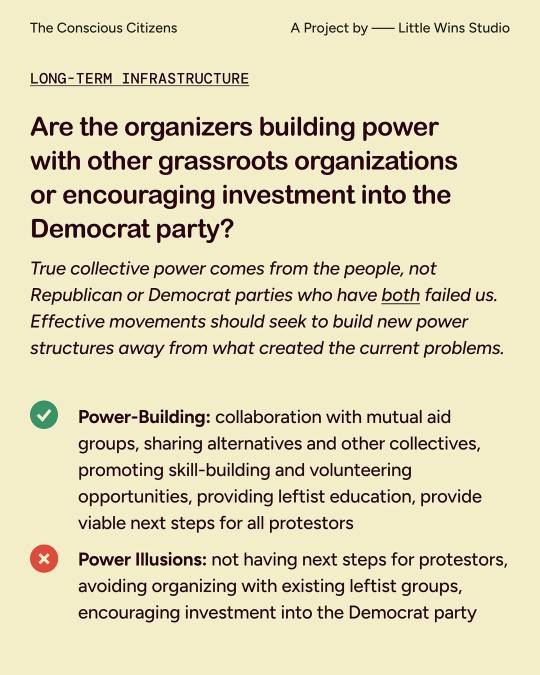

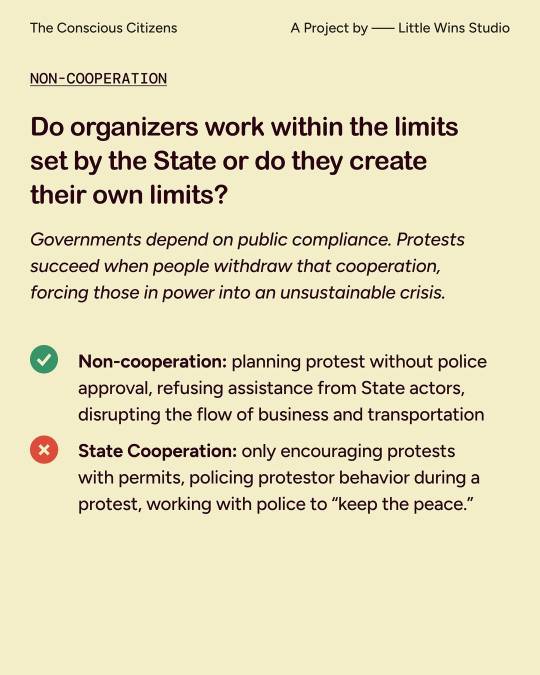

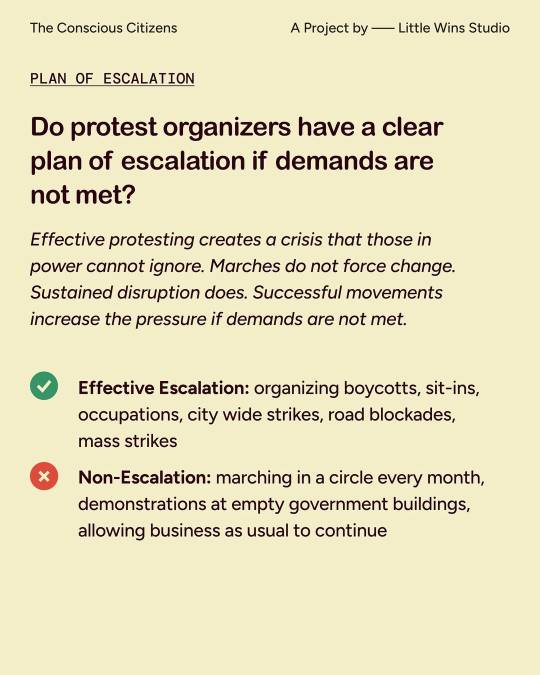
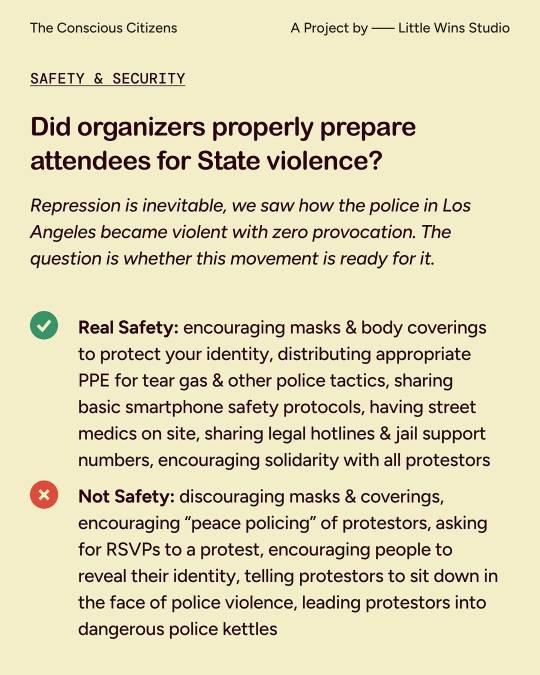
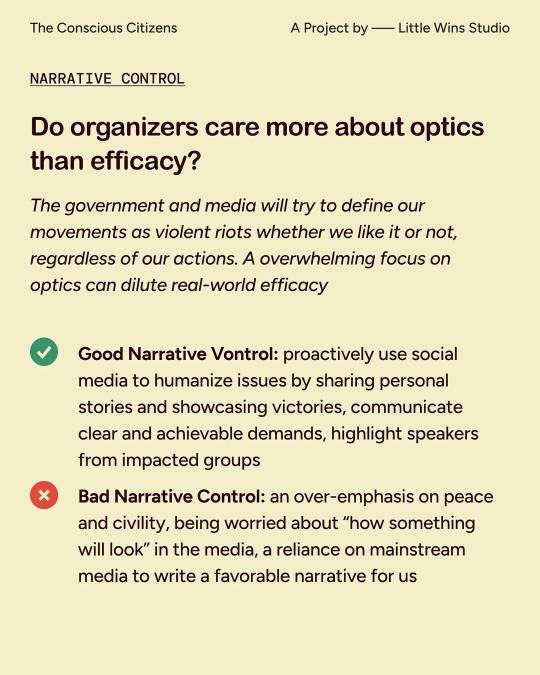
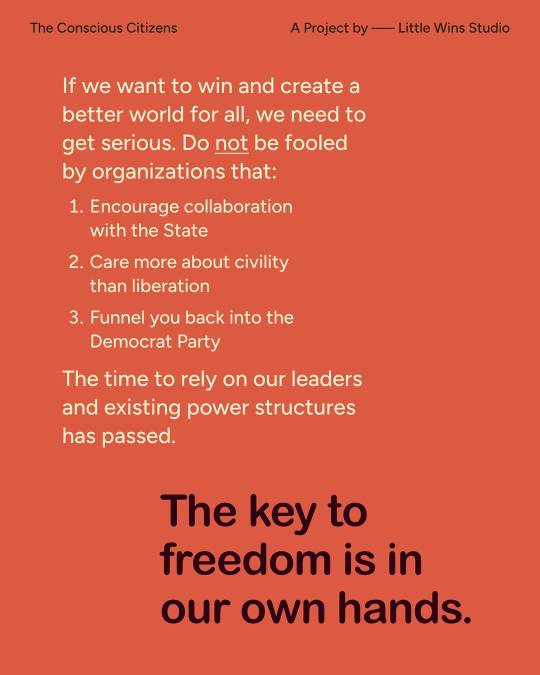
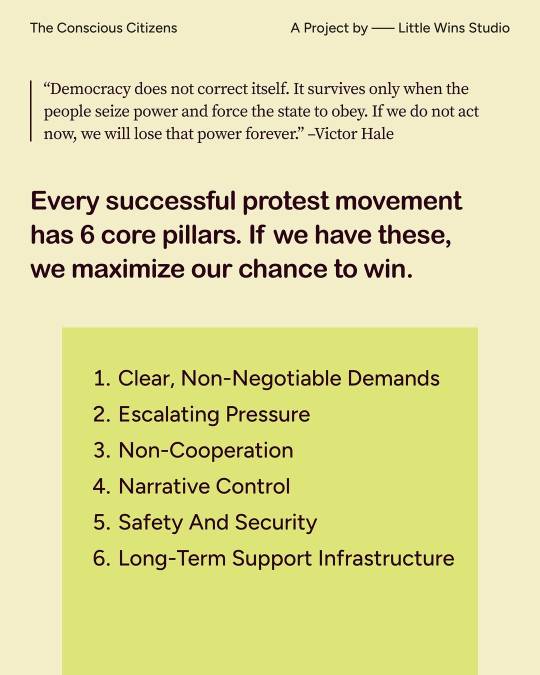

This is a calling-in for anyone who went to a 50501/No Kings Day protest. Please - we need y'all, and we need you to stay informed and engaged about what is needed to *actually* pull our country back from fascism and work towards liberation.
#Repost @theconsciouscitizens:
If you are a 50501 supporter, listen up. History already tells us what works and what doesn’t, so let’s reflect, because if we aren’t careful we’ll waste our time walking in circles.
➕ Follow @theconsciouscitizens for updates
#education #reflection #consciousliving #debrief #protest #strategy
#protest#resistance#strategy#liberation#antifascist#movement building#organizing#50501#50501 movement#50501 protests#calling in#anti trump#fuck trump#democrats#republicans#no kings day
14 notes
·
View notes
Text
i can imagine etho brainstorming how to get his rizz up, reading scientific research on human connection and realized "hmm people like you more the more you use their name. easy hack" and then he started making an effort to call people by their name more and thats why he's always saying people's name in conversation when he talks to them. bc its all calculated to make people like him more. and it WORKS
#sometimes etho lets it slip how much he plans and calculates his behavior like that time gem was laughing over how unexpected the things he#says are and he was like “thats how humor works gem” and#it really seems like he spent a long time researching humor and working to incorporate new techniques and strategies!!!!#and it makes sense bc this is how he approaches everything in life#by analyzing it to death#like what was that long spiel about how repetition in building is similar to repetition in music?? these are the thoughts of someone who#overanalyzes and overthinks everything#and there is no reason to think his social strategies are any different#points at him AUTISTIC!!!!!!!!!#dying over him asking bdubs texturing questions. “why did you put that block in that exact place.” bdubs: “ohh its ... art...”
144 notes
·
View notes